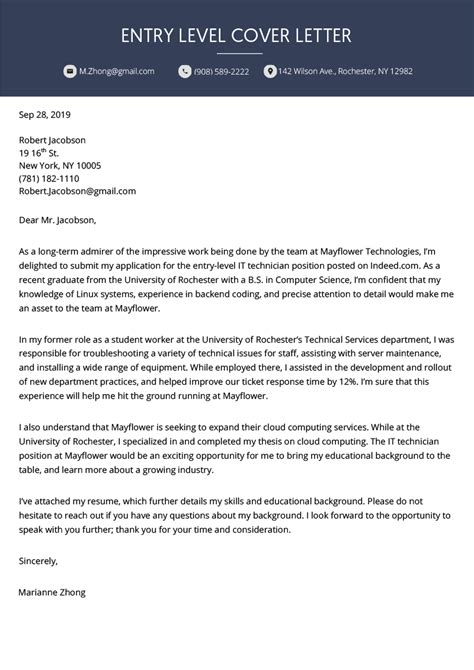Writing a cover letter can be a daunting task, especially for those who are new to the job market or looking to switch careers. However, with a little guidance, you can create a compelling and effective entry-level cover letter that showcases your skills and enthusiasm to potential employers. In this article, we will provide a comprehensive guide to help you craft an impressive entry-level cover letter template.
Why Is a Cover Letter Important?
Before we dive into the nitty-gritty of writing a cover letter, it's essential to understand its significance in the job application process. A cover letter serves as an introduction to your resume, highlighting your relevant skills, experience, and education. It also demonstrates your passion for the industry, company, or role, and showcases your writing skills and tone.
Key Components of an Entry-Level Cover Letter
When writing an entry-level cover letter, there are several key components to include:
- Introduction: Begin your letter with a formal greeting, addressing the hiring manager by title and last name (if possible).
- Summary: Provide a brief summary of your education, relevant coursework, and any relevant experience or skills.
- Body: In this section, highlight your achievements, skills, and experiences that align with the job requirements.
- Call-to-Action: Express your enthusiasm for the role and request an opportunity to discuss your application.
- Closing: End your letter with a professional closing, such as a thank you note and your signature.
Entry Level Cover Letter Template
Here is a basic template to help you get started:
[Your Name] [Your Address] [City, State, ZIP] [Date]
[ Hiring Manager's Name] [Company Name] [Company Address] [City, State, ZIP]
Dear [Hiring Manager's Name],
I am excited to apply for the [Job Title] role at [Company Name], as advertised on [Job Board/Source]. With a strong passion for [Industry/Field], I am confident that my skills and enthusiasm make me an ideal candidate for this position.
As a recent [graduate/soon-to-be graduate] in [Major], I have gained a solid foundation in [ relevant skills or coursework]. Throughout my academic journey, I have developed strong [transferable skills], which I believe would be an asset to your team.
In my previous [internship/volunteer] role at [Organization], I had the opportunity to [briefly describe your experience and achievements]. This experience not only honed my skills but also deepened my understanding of the industry.
I am particularly drawn to [Company Name] because of its [reputation/mission/values]. I am impressed by the company's commitment to [aspect of company's mission or values that resonates with you]. As someone who is eager to learn and grow, I believe that this company would provide me with the ideal environment to develop my skills and knowledge.
Thank you for considering my application. I would welcome the opportunity to discuss how my skills and experience align with the requirements of this role. Please feel free to contact me at [Your Contact Information].
Sincerely,
[Your Name]
Tips and Tricks
- Tailor your letter: Customize your cover letter for each job application, highlighting the skills and experiences that match the job requirements.
- Use active language: Use action verbs and a conversational tone to convey enthusiasm and passion.
- Keep it concise: Aim for a length of around 3-4 paragraphs, ensuring that your letter is easy to read and understand.
- Proofread: Carefully proofread your letter to avoid typos and grammatical errors.
- Use a professional font: Stick to traditional fonts, such as Arial, Calibri, or Times New Roman.
Common Mistakes to Avoid
- Typos and grammatical errors: These can make a negative impression and reduce your chances of getting an interview.
- Generic letters: Failing to tailor your letter to each job application can make it seem like you're not interested in the company or role.
- Overemphasis on weaknesses: Instead of highlighting your weaknesses, focus on your strengths and the skills you bring to the table.
- Poor formatting: Use a clear and concise format, with proper headings and white space.
Gallery of Entry Level Cover Letter Examples






Frequently Asked Questions
What is the purpose of a cover letter?
+A cover letter serves as an introduction to your resume, highlighting your relevant skills, experience, and education.
How long should a cover letter be?
+Aim for a length of around 3-4 paragraphs, ensuring that your letter is easy to read and understand.
Should I include my salary expectations in the cover letter?
+No, it's best to discuss salary expectations during the interview process, rather than including it in the cover letter.
By following these guidelines and using the entry-level cover letter template provided, you can create a compelling and effective cover letter that showcases your skills and enthusiasm to potential employers. Remember to tailor your letter to each job application, and don't be afraid to seek feedback from career counselors or mentors. Good luck with your job search!
